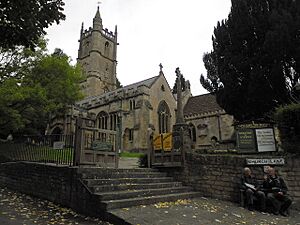Church of St John The Baptist, Batheaston facts for kids
Quick facts for kids Church of St John the Baptist |
|
|---|---|
 |
|
| Location | Northend, Batheaston, Somerset BA1 7EF, England |
|
Listed Building – Grade II*
|
|
| Designated | 1 February 1956 |
| Reference no. | 1320501 |
| Lua error in Module:Location_map at line 420: attempt to index field 'wikibase' (a nil value). | |
The Church of St John the Baptist is an old church located in Northend, a part of Batheaston in Somerset, England. This church was first built way back in the 12th century, which means it's over 800 years old! It was later updated and changed in the 15th century. Today, it is recognized as a Grade II* listed building. This means it's a very important historical building that needs to be protected.
The Church of St John the Baptist is part of a larger church area, or "parish," that also includes the church of St Catherine. Both churches are looked after by the church leaders in Bath.
The Church Tower
The church has a tall tower on its west side. This tower has four main levels, like floors stacked on top of each other. At the very top, there's a decorative wall called a parapet with openings. The tower also has strong supports called buttresses that stick out to help it stand firm.
Tower Features
You can see an octagonal (eight-sided) staircase that sticks out from the tower. In the south-east corner, there's a small turret that ends in a tiny spire, like a mini-tower on top of the main one. This tower was built around the year 1460. It was later rebuilt in 1834 by an architect named John Pinch the Younger, who was from Bath.
The tower has special windows that are tall and pointed, with two sections in each window. These windows have decorative shapes at the top. On the east side of the tower, there's a special carved space, or "niche," with a roof over it. Inside this niche, there is a figure, which is probably a statue of St John himself.
The Bells of the Tower
Inside the tower, there is a set of eight bells. These bells are rung together to create a beautiful sound, often for church services or special events.
Churchyard Tombs
In the churchyard, which is the area around the church, there are several old "chest tombs." These are stone tombs that look like large chests. They are also considered important historical structures and are listed alongside the church itself.
See also
- List of ecclesiastical parishes in the Diocese of Bath and Wells
 | Janet Taylor Pickett |
 | Synthia Saint James |
 | Howardena Pindell |
 | Faith Ringgold |

